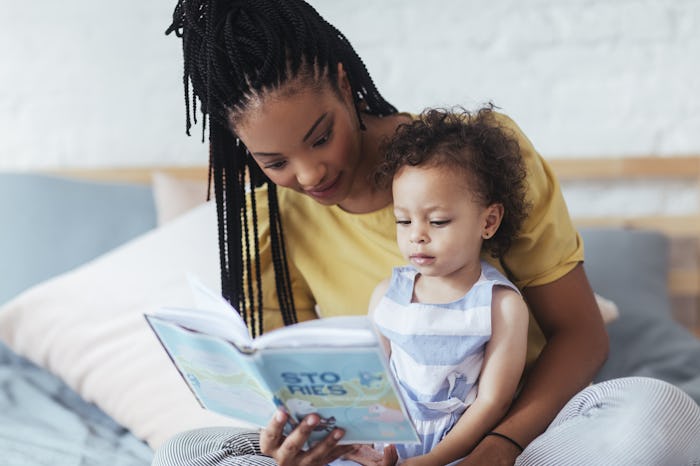Life
New Study Shows How Reading With Your Toddler Is Beneficial For Parents, Too
It's no secret that children reap a number of benefits when they are read to starting at a young age. In fact, studies have shown reading aloud to a child from infancy can help encourage their developing language skills, increase their vocabulary, and, of course, promote bonding between parents and their kids. Pretty cool, right? But wait... there's more. Because, according to new research, reading with your toddler is beneficial in several ways, including for parents.
New research from Rutgers Robert Wood Johnson Medical School may actually be the first to look at how reading to children affects parenting. The study — which was published in the Journal of Developmental & Behavioral Pediatrics earlier this month — showed a correlation between reading and a stronger parent-child bond, as well as less hyperactivity and attention problems in children.
"For parents, the simple routine of reading with your child on a daily basis provides not just academic but emotional benefits that can help bolster the child’s success in school and beyond," lead researcher Manual Jimenez said in a news release from Rutgers. "Our findings can be applied to programs that help parents and caregivers in underserved areas to develop positive parenting skills."
For the study, researchers looked at data from 2,165 mother-child pairs from 20 large U.S. cities. Mothers were asked how often they read to their children at ages 1 and/or 3. Two years later, these same mothers were interviewed again about how often they used physically and/or psychologically aggressive discipline. According to the study, they were also asked about their kids' behavior. (It's worth noting the study controlled for things like depression in parents, as well as financial hardship, which can both be contributing factors to harsh parenting and disruptive behavior in kids.) Here's a look at the study found:
- Frequent shared reading at age 1 was linked to less harsh parenting at age 3.
- Frequent shared reading at age 3 was associated with less harsh parenting at age 5.
- Moms who frequently read with their children reported fewer disruptive behaviors from their kids. (This might partially explain the reduction in harsh parenting.)
Of course, this isn't the first study by far to find positive results from reading to children. According to Psychology Today, reading to infants as young as 6 months old results in stronger vocabularies and better early literacy skills four years later.
Another study, according to The New York Times, found that reading to young children is linked to decreased levels of aggression, hyperactivity, and attention difficulties. “When parents read with their children more ... they learn to use words to describe feelings that are otherwise difficult and this enables them to better control their behavior when they have challenging feelings like anger or sadness," the study's lead author shared with The New York Times.
What does this all mean, you ask? Keep on reading to your little ones, parents! As monotonous as it can be, the benefits of doing so are definitely worth reading The Very Hungry Caterpillar a dozen times each day. (Just be sure their favorite book "gets lost" every once in a while — to both switch things up and to preserve your own sanity.) Because not only will your kiddos reap the benefits, so will you.
This article was originally published on
